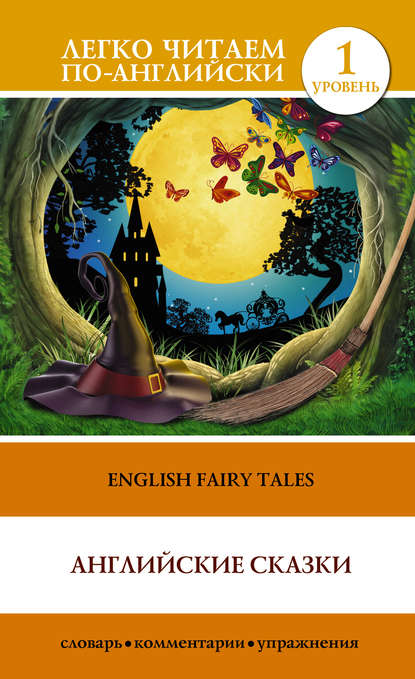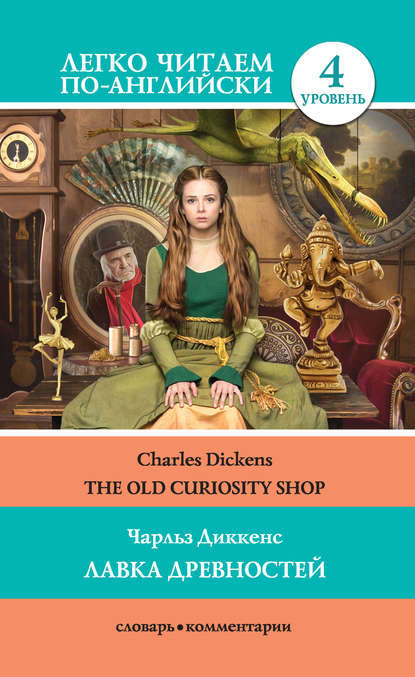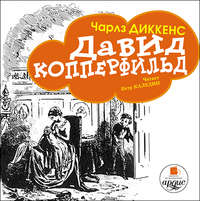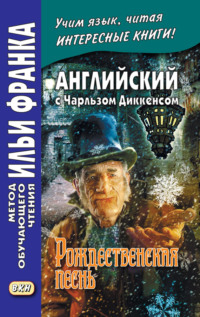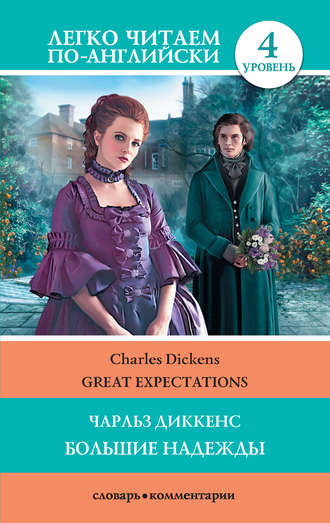
Полная версия
Great Expectations / Большие надежды
She looked all round the room in a glaring manner, and then said, leaning on me while her hand twitched my shoulder, “Come, come, come! Walk me, walk me![58]”
She was not strong, and after a little time said, “Slower!” After a while she said, “Call Estella!” so I went out on the landing and roared that name as I had done on the previous occasion. When her light appeared, I returned to Miss Havisham, and we started away again round and round the room.
Estella brought with her the three ladies and the gentleman, I didn’t know what to do.
“Dear Miss Havisham,” said a guest. “How well you look!”
“I do not,” returned Miss Havisham. “I am yellow skin and bone. And how are you, Camilla?” said Miss Havisham.
“Thank you, Miss Havisham,” she returned, “I am as well as can be expected.”
Miss Havisham and I had never stopped all this time, but kept going round and round the room.
“Matthew[59] couldnot come,” said Camilla.
“Matthew will come and see me at last,” said Miss Havisham, sternly, when I am laid on that table. That will be his place – there,” striking the table with her stick, “at my head! And yours will be there! And your husband’s there! And Sarah Pocket’s[60] there! And Georgiana’s[61] there! Now you all know where to take your stations when you come to feast upon me when you come to feast upon me.[62] And now go!”
She now said, “Walk me, walk me!” and we went on again.
“Bless you, Miss Havisham dear!” said the guests.
While Estella was away lighting them down, Miss Havisham still walked with her hand on my shoulder, but more and more slowly. At last she stopped before the fire, and said, after muttering and looking at it some seconds —
“This is my birthday, Pip.”
I was going to wish her many happy returns, when she lifted her stick.
“I don’t want it to be spoken of.[63] They come here on the day, but they dare not refer to it.”
Of course I made no further effort to refer to it.
“On this day of the year, long before you were born, this heap of decay was brought here. It and I have worn away together. The mice have gnawed at it, and sharper teeth than teeth of mice have gnawed at me.”
She held the head of her stick against her heart.
“When the ruin is complete,” said she, with a ghastly look, “and when they lay me dead, in my bride’s dress on the bride’s table – which shall be done, and which will be the finished curse upon him, – so much the better if it is done on this day![64]”
She stood looking at the table as if she stood looking at her own figure lying there. I remained quiet. Estella returned, and she too remained quiet. It seemed to me that we continued thus for a long time.
At last, Miss Havisham said, “Let me see you two play cards; why have you not begun?” With that, we returned to her room, and sat down as before; I was beggared, as before; and again, as before, Miss Havisham watched us all the time, directed my attention to Estella’s beauty.
When we had played some half-dozen games, a day was appointed for my return, and I was taken down into the yard to be fed in the former dog-like manner. There, too, I was again left to wander about as I liked.
I found myself in the dismal corner upon which I had looked out of the window. I looked in and, to my great surprise, saw a pale young gentleman with red eyelids and light hair.
This pale young gentleman quickly disappeared, and reappeared beside me.
“Halloa!” said he, “young fellow!”
I said, “Halloa!”
“Who let you in?” said he.
“Miss Estella.”
“Come and fight,” said the pale young gentleman.
What could I do but follow him?
“Stop a minute,” he said, “I ought to give you a reason for fighting. There it is!” In a most irritating manner he pulled my hair, dipped his head, and butted it into my stomach.
His spirit inspired me with great respect. He seemed to have no strength, and he never hit me hard. He got heavily bruised, for I am sorry to say that the more I hit him, the harder I hit him; but he came up again and again and again, until at last he got a bad fall with the back of his head against the wall. He went on his knees backwards and said, “That means you have won.”
He seemed so brave and innocent, that I felt but a gloomy satisfaction in my victory. However, I said, “Can I help you?” and he said “No thank you,” and I said “Good afternoon,” and he said “Same to you.”
When I got into the courtyard, I found Estella waiting with the keys. But she neither asked me where I had been, nor why I had kept her waiting; and there was a bright flush upon her face, as though something had happened to delight her. Instead of going straight to the gate, too, she stepped back into the passage, and beckoned me.
“Come here! You may kiss me, if you like.”
I kissed her cheek as she turned it to me. But I felt that the kiss was worth nothing.
Chapter 12
As we began to be more used to one another, Miss Havisham talked more to me, and asked me such questions as what had I learnt and what was I going to be? I told her I was going to be apprenticed to Joe, I believed. But I wanted to study, and I told her many times about that. I hoped that she might offer some help towards that desirable end. But she did not; on the contrary, she seemed to prefer my being ignorant. Neither did she ever give me any money – or anything but my daily dinner – nor ever say that I should be paid for my services.
Estella always let me in and out, but never told me I might kiss her again. Sometimes, she would condescend to me; sometimes, she would be quite familiar with me; sometimes, she would tell me that she hated me. Miss Havisham would often ask me in a whisper, or when we were alone, “Does she grow prettier and prettier, Pip?” And when I said yes (for indeed she did), would seem to enjoy it. Miss Havisham would embrace her with lavish love, murmuring something in her ear that sounded like “Break their hearts my pride and hope, break their hearts and have no mercy!”
One day Miss Havisham stopped short as she and I were walking, she leaning on my shoulder; and said with some displeasure —
“You are growing tall, Pip! Tell me the name of that blacksmith of yours.”
“Joe Gargery, ma’am.”
“Meaning the master you were to be apprenticed to?[65]”
“Yes, Miss Havisham.”
“Would Gargery come here with you?”
“At any particular time, Miss Havisham?”
“There, there! I know nothing about times. Let him come soon, and come along with you.”
Chapter 13
On the next day, Joe was arraying himself in his Sunday clothes to accompany me to Miss Havisham’s. The forge was shut up for the day.
We walked to town. As it was almost noon, Joe and I held straight on to Miss Havisham’s house. Estella opened the gate as usual, and, the moment she appeared, Joe took his hat off.
Estella took no notice of either of us, but led us the way that I knew so well. I followed next to her, and Joe came last.
Estella told me we were both to go in, so I conducted Joe into Miss Havisham’s presence. She was seated at her dressing-table, and looked round at us immediately.
“Oh!” said she to Joe. “You are the husband of the sister of this boy?”
Dear old Joe was looking like some extraordinary bird; standing speechless, with his mouth open as if he wanted a worm.
“You are the husband,” repeated Miss Havisham, “of the sister of this boy?”
It was very aggravating; but, throughout the interview, Joe was addressing me instead of Miss Havisham.
“Yes, you see, Pip, as I married your sister.”
“Well!” said Miss Havisham. “And you have reared the boy, with the intention of taking him for your apprentice; is that so, Mr. Gargery?”
“You know, Pip,” replied Joe, “as you and me were friends… But, Pip, if you had ever made objections to that, nobody would force you, don’t you see?”
“Has the boy,” said Miss Havisham, “ever made any objection? Does he like the trade?”
“Pip,” returned Joe, “I think, there were not any objection on your part, right?”
It was quite in vain for me to make him understand that he ought to speak to Miss Havisham.
“Have you brought his indentures with you?” asked Miss Havisham.
“Well, Pip, you know,” replied Joe, “you saw me put them in my bag, and therefore you know as they are here.” With which he took them out, and gave them, not to Miss Havisham, but to me. I am afraid I was ashamed of the dear good fellow – I know I was ashamed of him – when I saw that Estella stood at the back of Miss Havisham’s chair, and that her eyes laughed.
“You expected,” said Miss Havisham, as she looked them over, “no premium with the boy?”
“Joe!” I cried, for he made no reply at all. “Why don’t you answer – ”
“Pip,” returned Joe, “that is not a question requiring a answer between yourself and me. Should I say it?”Miss Havisham glanced at him and took up a little bag from the table beside her.
“Pip has earned a premium here,” she said, “and here it is. There are five-and-twenty guineas in this bag. Give it to your master, Pip.”
“This is very liberal on your part,[66] Pip,” said Joe, “ And now, old chap,” may we do our duty![67]
“Goodbye, Pip!” said Miss Havisham. “Let them out, Estella.”
“Am I to come again, Miss Havisham?” I asked.
“No. Gargery is your master now.”
We got out of the room. In another minute we were outside the gate, and it was locked, and Estella was gone. When we stood in the daylight alone again, Joe backed up against a wall, and said to me, “Astonishing!”
When I got into my little bedroom, I was truly wretched, and had a strong conviction on me that I should never like Joe’s trade. I had liked it once, but once was not now.[68]
Chapter 14
It is a most miserable thing to feel ashamed of home. Home had never been a very pleasant place to me, because of my sister’s temper. But, Joe had sanctified it, and I had believed in it. I had believed in the forge as the glowing road to independence. Within a single year all this was changed. Now it was all coarse and common, and I would not have had Miss Havisham and Estella see it on any account.[69]
Once, it had seemed to me that when I should be very proud and happy when I enter the forge. Now the reality was quite different, I only felt that I was dusty with the dust of small-coal.
It was not because I was faithful, but because Joe was faithful, that I never ran away and went for a soldier or a sailor. It was not because I had a strong sense of the virtue of industry,[70] but because Joe had a strong sense of the virtue of industry, that I worked very hard.
What I wanted, who can say? How can I say, when I never knew? What I dreaded was, that in some unlucky hour I should lift up my eyes and see Estella looking in at one of the wooden windows of the forge. I was haunted by the fear that she would, sooner or later, find me out, with a black face and hands, doing the coarsest part of my work, and would despise me. Often after dark, when I was pulling the bellows for Joe, I would look towards those panels of black night in the wall which the wooden windows then were, and would believe that she had come at last.
After that, when we went in to supper, the place and the meal would have a more homely look than ever, and I would feel more ashamed of home than ever.
Chapter 15
“Joe,” said I one day; “don’t you think I ought to make Miss Havisham a visit?”
“Well, Pip,” returned Joe, slowly considering. “What for?”
“What for, Joe? What is any visit made for?[71]”
“Pip,” said Joe, “Miss Havisham might think you wanted something – expected something of her.”
“Don’t you think I might say that I did not, Joe?”
“You might, old chap,” said Joe. “And she might believe it. Or she might not.”
Joe pulled hard at his pipe.
“You see, Pip,” Joe pursued, “Miss Havisham said “goodbye” to you, That’s all.”
“Yes, Joe. I heard her.”
“ALL,” Joe repeated, very emphatically.
“Yes, Joe. I tell you, I heard her.”
“Me to the North, and you to the South!”
“But, Joe.”
“Yes, old chap.”
“I have never thanked Miss Havisham, or asked after her, or shown that I remember her. My dear Joe, if you would give me a half-holiday tomorrow, I think I would go to the town and make a call on Miss Est – Havisham.”
“Her name,” said Joe, gravely, “isn’t Estavisham, Pip.”
So, tomorrow I found myself again going to Miss Havisham’s. Miss Sarah Pocket came to the gate. No Estella.
“How, then? You here again?” said Miss Pocket. “What do you want?”
When I said that I only came to see how Miss Havisham was, Sarah began to think if I was the right person to let me in. Finally, she let me in, and presently brought the sharp message that I was to “come up.”
Everything was unchanged, and Miss Havisham was alone.
“Well?” said she, fixing her eyes upon me. “I hope you want nothing? You’ll get nothing.”
“No indeed, Miss Havisham. I only wanted you to know that I am doing very well in my apprenticeship, and am always much obliged to you.”
“There, there!” with the old restless fingers. “Come now and then; come on your birthday. – Ay!” she cried suddenly, turning herself and her chair towards me, “You are looking round for Estella? Hey?”
I had been looking round – in fact, for Estella – and I stammered that I hoped she was well.
“Abroad,” said Miss Havisham; “educating for a lady; far out of reach; prettier than ever; admired by all who see her. Do you feel that you have lost her?”
There was such a malignant enjoyment in her last words, and she broke into such a disagreeable laugh, that I was at a loss what to say. When the gate was closed upon me by Sarah, I felt more than ever dissatisfied with my home and with my trade and with everything.
As I was loitering along the High Street, looking in disconsolately at the shop windows, and thinking what I would buy if I were a gentleman, who should come out of the shop but Mr. Wopsle.
“There’s something wrong,” said he, without stopping, “up at your place, Pip. Run all!”
“What is it?” I asked, keeping up with him.
“I can’t quite understand. The house seems to have been entered when Joe Gargery was out. Supposed by convicts. Somebody has been attacked and hurt.”
We were running, and we made no stop until we got into our kitchen. It was full of people; the whole village was there, or in the yard; and there was a surgeon, and there was Joe, and there were a group of women, all on the floor in the midst of the kitchen. My sister was lying without sense or movement on the bare boards.
Chapter 16
Joe had been at the Three Jolly Bargemen, smoking his pipe, from a quarter after eight o’clock to a quarter before ten. While he was there, my sister had been seen standing at the kitchen door, and had exchanged Good Night with a farm-worker going home. When Joe went home at five minutes before ten, he found her struck down on the floor, and promptly called in assistance.
My sister had been struck with something blunt and heavy, on the head and spine. And on the ground beside her, when Joe picked her up, was a convict’s leg-iron which had been filed asunder.
Knowing what I knew, I believed the iron to be my convict’s iron – the iron I had seen and heard him filing at, on the marshes – but my mind did not accuse him of having put it to its latest use.
It was horrible to think that I had provided the weapon.
The Constables and the Bow Street men from London[72] were about the house for a week or two, and did pretty much what I have heard and read of like authorities doing in other such cases. They took up several obviously wrong people, and they ran their heads very hard against wrong ideas, and persisted in trying to fit the circumstances to the ideas, instead of trying to extract ideas from the circumstances.
Long after these constitutional powers had dispersed, my sister lay very ill in bed. Her sight was disturbed, so that she saw objects multiplied; her hearing was greatly impaired; her memory also; and her speech was unintelligible.[73]
Chapter 17
I now fell into a regular routine of apprenticeship life. The most remarkable event was the arrival of my birthday and my paying another visit to Miss Havisham. I found Miss Sarah Pocket still on duty at the gate; I found Miss Havisham just as I had left her, and she spoke of Estella in the very same way, if not in the very same words. The interview lasted but a few minutes, and she gave me a guinea when I was going, and told me to come again on my next birthday.
I tried to decline taking the guinea on the first occasion, but with no better effect than causing her to ask me very angrily, if I expected more? Then, and after that, I took it.
The dull old house did not change, the yellow light in the darkened room, the faded spectre in the chair by the dressing-table glass stood still. Daylight never entered the house. It bewildered me, and under its influence I continued at heart to hate my trade and to be ashamed of home.
Wopsle’s second cousin Biddy used to come to help me and Joe. Biddy was a kind and intelligent but poor young woman. She was not beautiful – she was common, and could not be like Estella – but she was pleasant and wholesome and sweet-tempered. She had curiously thoughtful and attentive eyes; eyes that were very pretty and very good. I liked to talk to her, and she usually listened to me with great attention.
“Biddy,” said I one day, “we must talk together. And I must consult you a little more. Let us have a quiet walk on the marshes next Sunday, Biddy, and a long chat.”
Joe more than readily undertook the care of my sister on that Sunday afternoon, and Biddy and I went out together. It was summer-time, and lovely weather. When we had passed the village and the church and the churchyard, and were out on the marshes and began to see the sails of the ships as they sailed on, I resolved that it was a good time and place for the admission of Biddy into my inner confidence.
“Biddy,” said I, “I want to be a gentleman.”
“O, I wouldn’t, if I was you!” she returned. “What for?”
“Biddy,” said I, with some severity, “I have particular reasons for wanting to be a gentleman.”
“You know best, Pip; but don’t you think you are happier as you are?”
“Biddy,” I exclaimed, impatiently, “I am not at all happy as I am. I am disgusted with my calling and with my life. Don’t be absurd.”
“Was I absurd?” said Biddy, quietly raising her eyebrows; “I am sorry for that; I didn’t mean to be. I only want you to do well, and to be comfortable.”
“I could lead a very different sort of life from the life I lead now. See how I am going on. Dissatisfied and uncomfortable, coarse and common!”
Biddy turned her face suddenly towards mine, and looked far more attentively at me than she had looked at the sailing ships.
“It was neither a very true nor a very polite thing to say,” she remarked, directing her eyes to the ships again. “Who said it?”
I answered, “The beautiful young lady at Miss Havisham’s, and she’s more beautiful than anybody ever was, and I admire her dreadfully, and I want to be a gentleman on her account.[74]”
“Do you want to be a gentleman, to spite her or to gain her over?[75]
Конец ознакомительного фрагмента.
Текст предоставлен ООО «ЛитРес».
Прочитайте эту книгу целиком, купив полную легальную версию на ЛитРес.
Безопасно оплатить книгу можно банковской картой Visa, MasterCard, Maestro, со счета мобильного телефона, с платежного терминала, в салоне МТС или Связной, через PayPal, WebMoney, Яндекс.Деньги, QIWI Кошелек, бонусными картами или другим удобным Вам способом.
Примечания
1
Pirrip – Пиррип
2
Philip – Филип
3
Pip – Пип
4
Joe Gargery – Джо Гарджери
5
Keep still! – Замолчи!
6
wittles – жратва
7
Or I’ll have your heart and liver out. – А не то я вырву у тебя сердце с печёнкой.
8
tear him open – зарежет его
9
she had brought me up “by hand” – она воспитала меня «своими руками»
10
fellow-sufferers – товарищи по несчастью
11
old chap – старина
12
There was a convict off last night. – Вчера вечером один арестант дал тягу.
13
Lord bless the boy! – Наказание с этим мальчишкой!
14
prison-ships – плавучая тюрьма
15
I’ll pull him down. – Я выслежу его.
16
to take me up – чтобы взять меня под стражу
17
Wopsle – Уопсл
18
Hubble – Хабл
19
Pumblechook – Памблчук
20
theatrical declamation – театральная декламация
21
will you throw your eye over them? – не будете ли вы так добры взглянуть на них?
22
It may prevent some persons laying under suspicion alonger me. – Это для того, чтобы подозрение не пало на кого другого.
23
it was a drawback on my learning – моему ученью это здорово мешало
24
a fine figure of a woman – видная женщина
25
Never mind me. – Ну что говорить обо мне.
26
Your sister a master-mind. – Твоя сестра – ума палата.
27
Havisham – Хэвишем
28
I considered Mr. Pumblechook wretched company. – В обществе мистера Памблчука я чувствовал себя отвратительно.
29
Seven times nine, boy? – Сколько будет семью девять, мальчик?
30
on an empty stomach – на пустой желудок
31
math = mathematics – математика
32
Estella – Эстелла
33
playing to order – игра по заказу
34
a common laboring boy – самый обыкновенный деревенский мальчишка
35
Nothing but beggar my neighbor. – Ни во что другое, как кроме в «дурачка».
36
Beggar him. – Оставь его в дураках.
37
Play the game out. – Доиграй до конца.
38
the chair of honor – почётное место
39
How did you get on up town?” – Как ты провёл время в городе?
40
Forty-three pence? – Сколько составят сорок три пенса?
41
for instance – например
42
What like is Miss Havisham? – Какая из себя мисс Хэвишем?
43
This is the way to have him. – Вот как надо с ним обращаться.
44
in the name of gracious – боже милостивый
45
sedan-chair – портшез (лёгкое переносное кресло, в котором можно сидеть полулёжа; паланкин)




